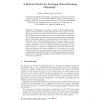76 search results - page 13 / 16 » Implicit Culture for Information Agents |
WECWIS
1999
IEEE
13 years 12 months ago
1999
IEEE
The Internet and the World Wide Web provide a global virtual marketplace. However, there is little information about the behavior of e-commerce users worldwide. The goal of the pa...
EELC
2006
13 years 11 months ago
2006
Abstract. In this paper we introduce a model for the simulation of language evolution, which is incorporated in the New Ties project. The New Ties project aims at evolving a cultur...
SIGCSE
2008
ACM
13 years 7 months ago
2008
ACM
Game development is quickly gaining popularity in introductory programming courses. Motivational and educational aspects of game development are hard to balance and often sacrific...
GW
2009
Springer
13 years 5 months ago
2009
Springer
Speakers in all cultures and ages use gestures as they speak (i.e., cospeech gestures). There have been different views in the literature with regard to whether and how a specific ...
ECAI
2008
Springer
13 years 9 months ago
2008
Springer
In this paper, we propose a policy gradient reinforcement learning algorithm to address transition-independent Dec-POMDPs. This approach aims at implicitly exploiting the locality...

